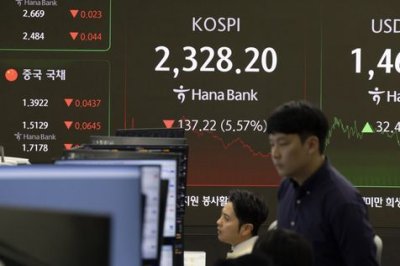South Korean stock dealers work in front of monitors at the Hana Bank in Seoul on Monday. The South Korea Composite Stock Price Index plunged 5.57% to close at 2,328.20. Photo by Jeon Heon-Kyun/EPA-EFE
April 7 (UPI) — South Korea’s government on Monday said it will provide up to $68.12 billion in emergency liquidity and other market stabilization measures for local companies hit by U.S. tariffs and amid tumbling stocks.
Last week, President Donald Trump imposed a 25% tariff on South Korean goods. A 10% baseline tariff on 180 trading partners took effect Saturday, and the reciprocal duties for the so-called “worst” offenders will be imposed Wednesday.
Kim Byoung-hwan, chief of the Financial Services Commission, told the heads of the top five financial holding firms about the plans in Seoul, Yonhap News Agency reported.
“Uncertainties are running high across the domestic economy, industries and financial markets due to the tariff policy,” Kim said. “Financial holding companies and policy finance institutions should take the lead in stabilizing the market and play a more active role in providing financial support to businesses and other sectors.”
They include companies that manufacture semiconductors, secondary batteries, biotechnology, artificial intelligence and robotics, the Korean Times reported.
Also, he said FCS will make “all-out” efforts to smoothly implement market stabilization measures to inject liquidity any time.
Since Trump’s tariffs announcement Wednesday, worldwide stock markets have plunged.
That includes a 5.5% decline by the Korean Composite Stock Price Index to 2,328.20, the fourth day in a row of losses. The market was halted for five minutes in a circuit-breaker procedure during the opening after heavy drops.
The index is at the lowest level since October 2023.
Losing companies outnumbered winners 862-68.
“Volatility in the Korean stock markets heightened on the Trump administration’s stronger-than-expected tariff policies,” Park Seok-joong, an analyst at Shinhan Securities, said.
“None of the Korean export industries will be able to evade the influence of the U.S. tariff scheme.”
Many large-cap stocks were at their lows for the year.
Big declines were seen at companies that export to the United States.
Hyundai Motor, the top automaker in South Korea, sank 6.62%.
Hanwha Aerospace, a major defense firm, skidded 8.55%.
Samsung Electronics lost 5.17% and its biotech division dropped 5.71%.
Steel giant POSCO Holdings slumped 6.59%.
Among shipbuilders, Hanwha Ocean declined 9.81% and HD Hyundai Heavy went down 8.17%.
“Especially in times like these, the financial sector must fulfill its core function – ensuring stable markets and uninterrupted financial intermediation,” Kim said. “We expect financial holding companies and policy institutions to take the lead in supporting both market stability and capital access for businesses.”
South Korea’s currency dropped 2.3% to 1,467.8 won against the U.S. dollar, its biggest single-day decline, 2.3%, against U.S. currency since March 19, 2020, at the onset of the Covid-19 pandemic.
South Korean Trade Minister Cheong In-kyo plans to visit Washington on Tuesday for tariff negotiations with U.S. administration officials, Seoul’s trade ministry said.
“We are in a severe situation where Korean companies exporting to or operating in the U.S. are expected to suffer difficulties due to the reciprocal tariffs announced on April 2, as well as duties on steel, aluminum, cars and auto parts,” Cheong said in a press release.
“The government will put in all-out efforts in negotiations with the U.S. to minimize the impact of Washington’s trade policies on Korean businesses and industries,” he added.
